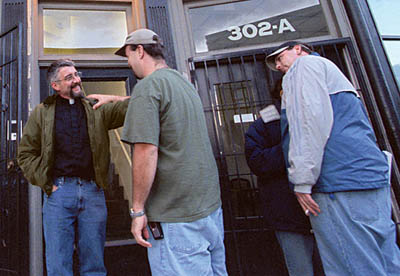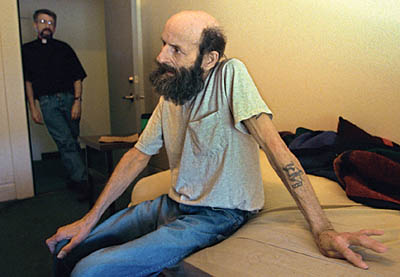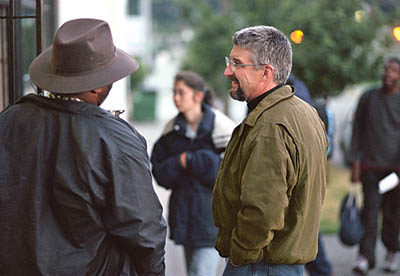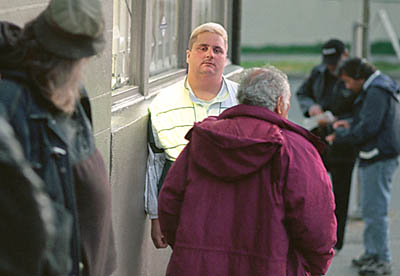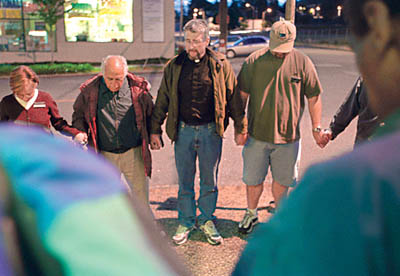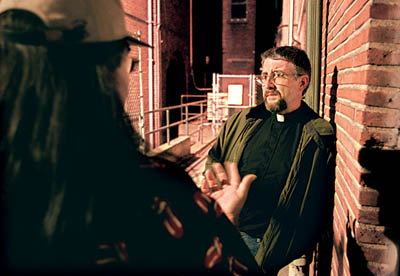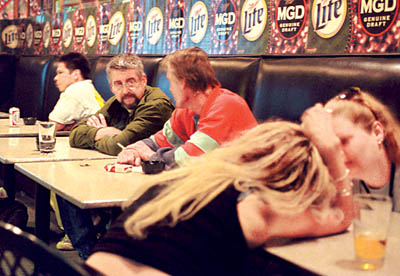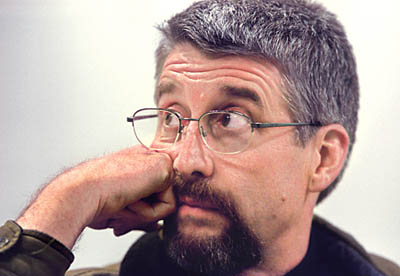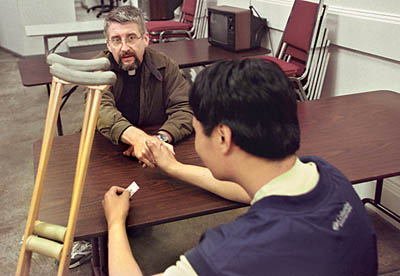 |


|
Summer 2002 | Volume 25, Number 3 | Features | ||||
|
One Tuesday Night Alumnus Ministers to a Congregation of the Homeless ON ANY GIVEN NIGHT, about 7,300 homeless people sleep in downtown Seattle. Operation Nightwatch, an outreach center based in a 1909 storefront near the train station, serves late-night dinners to an average of 130 and tries to find them shelter beds.
During the day, Reynolds organizes scores of volunteers, accepts truckloads of donations such as bread and carpeting, and manages two upstairs floors of apartment rooms reserved for seniors and handicapped residents. At least one night a week, including this particular Tuesday, Reynolds roams the downtown area, stopping at bars and freeway underpasses to talk with people. “This is my church,” he says, nodding to the dozens of men lining up outside for dinner.
Foxes have dens, and birds have nests, but the Son of Man has no place to call his own.9:00 p.m. Upstairs in the apartment hallway, Reynolds says he needs to check in on Herchel, a man with Huntington’s disease, a degenerative brain disorder. Reynolds knocks on the man’s door, and when it opens, heat and cigarette smoke swirl out from the bedroom-sized apartment. The floor is taken up with a mattress, a dresser and a few belongings. Herchel has lived here since Nightwatch bought the building three years ago. He’s been a dedicated volunteer, sweeping and cleaning the center. Before that, he was homeless for 17 years. “Aren’t you hot in here?” Reynolds asks. “You gotta get some air in here; it’s too stuffy. Let’s turn this fan on. Are you drinking enough water? You sure? Because when it’s hot like this, you have to drink a lot of water. You taking your medicine? You want me to get you anything at the store? You sure?”
9:15 p.m.
Government sources pay only 5 percent of the center’s annual budget, which in 1994 was $75,000. Today, with the storefront building’s upkeep and so many people to serve, the budget is $375,000. “We have to pay for shelter for these guys out of our budget,” Reynolds says. “We’re supported mainly by private donations. Most donors pay about $25 to $100 a month. Interdenominational groups do fund-raisers for us and serve the meals, because we have no budget for food.” Neighbors used to complain about people hanging around outside Operation Nightwatch before dinner. Some of the homeless people were standing in line for five hours to make sure they got a shelter pass. Now 9:00 p.m. is the earliest time to get in line. Those who stood in line last night but didn’t get a place to stay get first dibs tonight.
As evening fell, [Jesus’] disciples came to him and said, “... Send away these crowds now, so that they can go into the villages and buy themselves food.”
9:30 p.m. He wonders what’s for dinner. “Pasta sounds good. But I can hardly keep my eyes open.” He asks for a hug. When he gets one, he says, “Thanks.” After a while he says he wants to cry but doesn’t know why.
9:45 p.m. About 30 percent of the people served at Nightwatch are mentally ill. Reynolds says, “If they go up to Harborview [Medical Center] voluntarily, they get a pill and get sent onto the street again. That’s not going to cure anybody.” In these cases, he says, the health care system is just not working.
When you give a feast, invite the poor. … They cannot pay you back. But God will bless you and reward you. …”
10:00 p.m. Tonight 121 people show up, nine fewer than average. No families are here, although three families came the night before. Sometimes, especially in the cold winter months when shelter space is at a premium, Reynolds must turn away dozens of people. Priority is given to women, men over age 50, and families with children. Once inside, they can watch TV, while away some hours, and get a pass for shelter for the night.
10:15 p.m.
A large number of … disreputable folk came in and joined [Jesus] and his disciples. For there were many such people among his followers.
10:45 p.m. “I wear a [minister’s] collar so people will come up to me on the street,” he explains. “If I wore a suit and tie, nobody would talk to me. This way, they know what I am.” One guy at the bar doesn’t know exactly what Reynolds is, but he’s curious. He asks someone sitting nearby, “What is that guy, a priest or a rabbi or what?” Later, Reynolds hears about the man’s comment and belatedly replies, “I’m a what.”
11:15 p.m. For years, Seattle Pacific students have volunteered here, cooking meals and handing out passes for shelters. “We survive on SPU volunteers,” says Reynolds. Past volunteer Stephanie Kelly ’91 remembers what she learned there: “Serving at Nightwatch means honoring a person’s dignity, because it’s embarrassing to have to ask for food and a place to stay.”
11:45 p.m.
“Lord, when did we ever see you hungry and give you food? ... When did we see you a stranger and make you welcome?”
— BY MARGARET D. SMITH |
Click for larger images.
|

